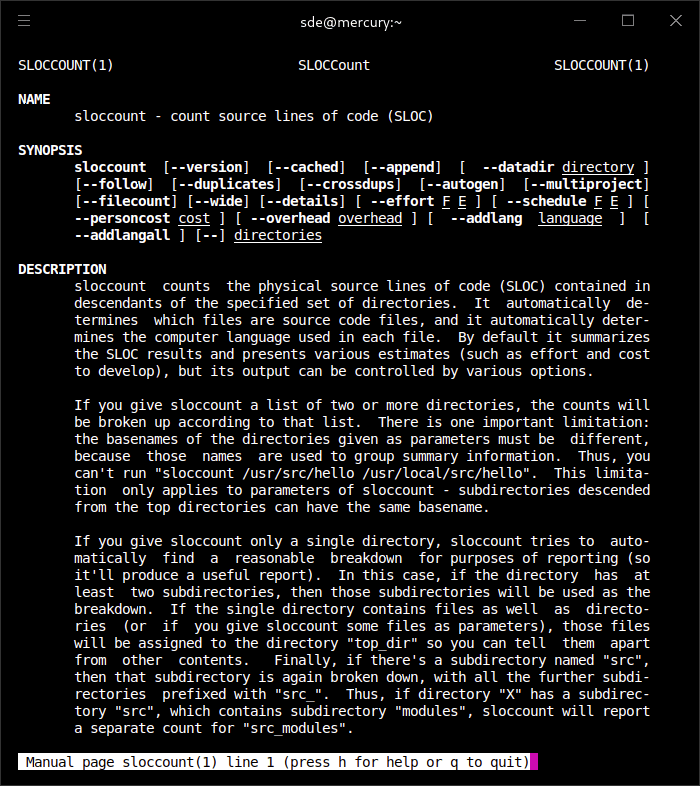SLOCCount is a set of tools for counting physical Source Lines of Code (SLOC) in a large number of languages of a potentially large set of programs. SLOCCount is a “software metrics tool” or “software measurement tool”. SLOCCount was developed to count SLOC in a Linux distribution, but it can be used for counting the SLOC of arbitrary software systems.
SLOCCount has a number of ease-of-use features. It can count physical SLOC for a wide number of languages. Listed alphabetically, they are Ada, Assembly (for many machines and assemblers), awk (including gawk and nawk), Bourne shell (and relatives such as bash, ksh, zsh, and pdksh), C, C++, C# (also called C-sharp or cs), C shell (including tcsh), COBOL, Expect, Fortran (including Fortran 90), Haskell, Java, lex (including flex), LISP (including Scheme), makefiles (though they aren’t usually shown in final reports), Modula3, Objective-C, Pascal, Perl, PHP, Python, Ruby, sed, SQL (normally not shown), TCL, and Yacc. It can gracefully handle awkward situations in many languages, for example, it can determine the syntax used in different assembly language files and adjust appropriately, it knows about Python’s use of string constants as comments, and it can handle various Perl oddities (e.g., perlpods, here documents, and Perl’s _ _END_ _ marker). It even has a “generic” SLOC counter that you may be able to use count the SLOC of other languages (depending on the language’s syntax).
SLOCCount can also take a large list of files and automatically categorize them using a number of different heuristics. The heuristics automatically determine if a file is a source code file or not, and if so, which language it’s written in. For example, it knows that “.pc” is usually a C source file for an Oracle preprocessor, but it can detect many circumstances where it’s actually a file about a “PC” (personal computer). For another example, it knows that “.m” is the standard extension for Objective-C, but it will check the file contents to see if really is Objective-C. It will even examine file headers to attempt to accurately determine the file’s true type. As a result, you can analyze large systems completely automatically.
SLOCCount has some report-generating tools to collect the data generated, and then present it in several different formats and sorted different ways. The report-generating tool can also generate simple tab-separated files so data can be passed on to other analysis tools (such as spreadsheets and database systems).
This is free and open source software.
Website: dwheeler.com/sloccount
Support: Documentation
Developer: David A. Wheeler,
License: GNU General Public License v2.0

SLOCCount is written in C. Learn C with our recommended free books and free tutorials.
| Popular series | |
|---|---|
| The largest compilation of the best free and open source software in the universe. Each article is supplied with a legendary ratings chart helping you to make informed decisions. | |
| Hundreds of in-depth reviews offering our unbiased and expert opinion on software. We offer helpful and impartial information. | |
| The Big List of Active Linux Distros is a large compilation of actively developed Linux distributions. | |
| Replace proprietary software with open source alternatives: Google, Microsoft, Apple, Adobe, IBM, Autodesk, Oracle, Atlassian, Corel, Cisco, Intuit, SAS, Progress, Salesforce, and Citrix | |
| Awesome Free Linux Games Tools showcases a series of tools that making gaming on Linux a more pleasurable experience. This is a new series. | |
| Machine Learning explores practical applications of machine learning and deep learning from a Linux perspective. We've written reviews of more than 40 self-hosted apps. All are free and open source. | |
| New to Linux? Read our Linux for Starters series. We start right at the basics and teach you everything you need to know to get started with Linux. | |
| Alternatives to popular CLI tools showcases essential tools that are modern replacements for core Linux utilities. | |
| Essential Linux system tools focuses on small, indispensable utilities, useful for system administrators as well as regular users. | |
| Linux utilities to maximise your productivity. Small, indispensable tools, useful for anyone running a Linux machine. | |
| Surveys popular streaming services from a Linux perspective: Amazon Music Unlimited, Myuzi, Spotify, Deezer, Tidal. | |
| Saving Money with Linux looks at how you can reduce your energy bills running Linux. | |
| Home computers became commonplace in the 1980s. Emulate home computers including the Commodore 64, Amiga, Atari ST, ZX81, Amstrad CPC, and ZX Spectrum. | |
| Now and Then examines how promising open source software fared over the years. It can be a bumpy ride. | |
| Linux at Home looks at a range of home activities where Linux can play its part, making the most of our time at home, keeping active and engaged. | |
| Linux Candy reveals the lighter side of Linux. Have some fun and escape from the daily drudgery. | |
| Getting Started with Docker helps you master Docker, a set of platform as a service products that delivers software in packages called containers. | |
| Best Free Android Apps. We showcase free Android apps that are definitely worth downloading. There's a strict eligibility criteria for inclusion in this series. | |
| These best free books accelerate your learning of every programming language. Learn a new language today! | |
| These free tutorials offer the perfect tonic to our free programming books series. | |
| Linux Around The World showcases usergroups that are relevant to Linux enthusiasts. Great ways to meet up with fellow enthusiasts. | |
| Stars and Stripes is an occasional series looking at the impact of Linux in the USA. | |
